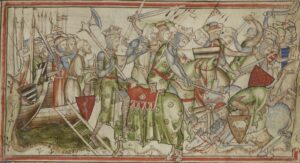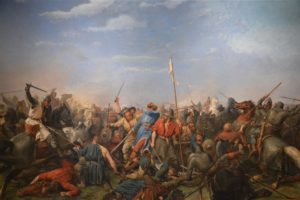
When Tostig was exiled from England in November, 1065, Earls Edwin and Morcar (or Eadwine and Morkere) must have felt pretty secure in their earldoms. Is it possible they were trying to re-establish a northern entity similar to the Danelaw? Professor Edward A. Freeman seemed to think so, and other historians make the same suggestion. Nonetheless, King Edward’s sudden death must have thrown their plans into some confusion. Like everyone else, Edwin and Morcar would have been at the Christmas Court for the consecration of Westminster Abbey, and they stayed when the king took to his sickbed.
The very day King Edward breathed his last, Harold must have summoned the Witan to choose a successor, since I doubt there would have been time the following morning, with a funeral and coronation to arrange. I can just imagine the state Edward’s court must have been in, with all the running around and jockeying for position. Did anyone have time to mourn the king’s passing? Was Harold’s election in any doubt? Probably not, though it seems that he had to entice Edwin and Morcar to support him; perhaps this is when their sister’s betrothal to the new king came into play. Perhaps they merely bent to necessity, for they had no support in the south and Harold’s star was in the ascendant.
It stands to reason that Northumbria was not fully represented at the Witan electing Harold. What came of this imbalance manifested itself as a passive resistance to Harold’s rule, so much so that within a month the new king was on his way to visit his reluctant earldom with the Bishop of Worcester and a small contingent of housecarls. His conciliatory gesture bore fruit and he is said to have won over the hearts of the stubborn northerners, while flattering them by marring Ealdgyth, sister of Edwin and Morcar, possibly at York Cathedral.
We hear nothing further about the northern earls until Tostig made his move in May. After Harold chased him away from Sandwich, Tostig ravaged the coast of Lindesey in Mercia. Edwin and Morcar were vigilant and soon drove Tostig away, causing his little fleet to disperse. Presumably they spent the rest of the summer guarding the north against invasion—or maybe not. When Harald Hardrada started ravaging the coast of Cleveland and devastated the sturdy town of Scarborough, the local levies had to rely on their own devices to resist the invaders. The Norwegian fleet sailed unopposed into the Humber and dropped anchor near the little town of Riccall on the Ouse, nine miles from York.
Had the sons of Aelfgar been busy raising an army all along? Apparently that’s what they were doing, for Edwin and Morcar chose this time to advance on Hardrada in defense of York with about 5000 men. Later historians have castigated the earls for risking all and not waiting for King Harold to come to their aid. But given the situation, perhaps they thought it was their duty to defend their own territory. They certainly had a formidable army and put up a stout defense at Fulford Gate, only to be defeated by the superior generalship of the battle-hardened Hardrada.
The Battle of Fulford has hardly made a splash in the history books, but its consequences were very significant. Both sides fought long and hard, and it’s estimated that there was a total of 11,000 men on the field. Perhaps 15% of this number was killed, and chroniclers stated that the bodies were so thick the victors could walk across them without getting their feet wet from the swamp. The battle was lost as Harald brought his best fighters around the Northumbrian flank and trapped the defenders against the ditch. Earl Morcar was said to have fled the field and Edwin retreated to York with the broken remains of his army. But York was in no position to defend itself any further and immediately surrendered to the invaders. Luckily, Hardrada and Tostig were not interested in plundering the town, but they arranged for an exchange of hostages four days thence at Stamfordbridge.

King Harold’s lightning march from the south saved York from further destruction. He did pass through the city on his way to Stamfordbridge, and apparently only the stoutest housecarls joined his forces. Edwin certainly did not, and I believe Morcar was still unaccounted for. And when Harold was called back south to deal with Duke William, the northern earls lagged behind, claiming they needed more time to gather their broken forces. Harold vainly waited in London for their appearance, then resolved to move on and face the Normans without them.
Much has been made of Edwin and Morcar’s failure to help Harold in his time of need—especially since the king just saved their necks while losing many of his most experienced housecarls at Stamfordbridge. Were the northerners just too exhausted, too disabled to undertake a forced march after having just fought two epic battles? Or was it possible that Edwin and Morcar were holding off in the hopes that they might get a better deal from Duke William? Some historians think their subsequent behavior indicated less-than-noble intentions. Many have thought the earls harbored their family’s historic antipathy toward the house of Godwine. It’s very likely that the concept of a united England had not yet come into play, and it’s possible that Edwin and Morcar were pursuing an ambition of a separate northern kingdom, starting with the Northumbrian rebellion against Tostig. If this this the case, they were destined to be sorely undeceived.
Lothurr says:
Nice posts, they were great and rather fascinating, mayhaps you could make your next posts about their sister, or about Harold himself as he is a fairly elusive if interesting figure in history.
Mercedes Rochelle says:
Thank you, Lothurr! I have one more post on Edwin and Morcar, and it’s an interesting idea to do one on Ealdgyth. I’m not sure how much I can dig up on her, but she is kind of a pitiful character to me, since her only use seems to have been political. Harold, of course, is a book unto himself and I’ve begun his story in THE SONS OF GODWINE. We reach the “climax” in my upcoming book, FATAL RIVALRY which I hope to finish this fall.
Richard Matthewman says:
Hi Mercedes,
Thank you for your post.
I’m wondering if you have any further information about Tostig and Harald’s journey south to the Humber. Everyone cites the same story about Scarborough, but I wonder if there is any information about Tostig’s skirmish into Holderness and, if so, why he went there? And what did he do there?
Good luck and best wishes for your ongoing research.
Mercedes Rochelle says:
Hi Richard. Sorry to say I couldn’t find anything else; everything I discovered was used in my novel! Frustrating, isn’t it? BTW, did you read William Kapelle’s “The Norman Conquest of the North”? It goes way back to Siward’s day and is very helpful.